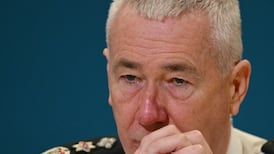Prominent republican Thomas "Slab" Murphy had nothing to do with cattle farming, according to his lawyers in an appeal against conviction for evading tax on profits from a farming business.
The 67-year-old, whose farm at Ballybinaby, Hackballscross, Co Louth, straddles the border with Northern Ireland, had pleaded not guilty at the non-jury Special Criminal Court to nine charges of failing to comply with tax laws in the Irish Republic for the years 1996/97 to 2004.
The three-judge Special Criminal Court found Murphy guilty on all counts and he was sentenced to 18 months imprisonment on February 26 last.
Murphy's barrister, John Kearney QC, told the Court of Appeal on Tuesday that his client's brother, Patrick Murphy, was in control of the farm from before 1991 until the present time and that the authorities went after Thomas Murphy for tax his brother Patrick had already paid.
Mr Kearney said documents on the movement of cattle led to a position, which could not be disproved, that Patrick Murphy was in charge of “all this”. He was the “man in the fields” in ongoing control. All of the documents, all of the cheques “turn up in his shed”, Mr Kearney said.
In reference to certain transactions, Mr Kearney said a witness gave evidence that Patrick Murphy “probably” forged or filled in the body of these documents.
Mr Kearney said a reasonable inference could be drawn from the documents that Thomas Murphy had nothing to do with cattle farming and Patrick Murphy used his name.
In relation to the banking evidence, the prosecution’s position was “follow the money”, Mr Kearney said.
Cheques from cattle sales were going into a particular account. But the evidence demonstrated a “real possibility” that Patrick Murphy operated the account not Thomas Murphy, Mr Kearney said.
Patrick Murphy was no stranger to the Dundalk bank branch in question because he had another account there and there was no evidence that Thomas Murphy ever set foot in that branch.
A forensic accountant was of the belief that Patrick Murphy had, during the timeframe of the charges, been using accounts of other persons. In other words, Patrick Murphy had a propensity to use bank accounts of other people, which was significant, counsel said.
If Patrick Murphy was the sort of person who would put his farm into his wife’s name, he might also put a farm into his brothers name, counsel suggested.
No matter what level of analysis you do, “Patrick Murphy lurks”.
This was the type of joined-up analytical work the Special Criminal Court should have done, counsel submitted.
Having brought the courts attention to this analysis, it was “staggering” that the court didn’t mention “any of it” in its verdict.
Counsel submitted that in a circumstantial case, the Special Criminal Court was duty bound to “put the jigsaw together” but the court took seven pieces of the prosecution jigsaw and totally disregarded the alternative.
Last December, following a 32-day trial, Murphy was found guilty of nine charges of failing to furnish a return of his income, profits or gains or the source of his income, profits or gains to the Collector General or the Inspector of Taxes for the years 1996/97 to 2004.
The court had heard evidence that the Criminal Assets Bureau’s assessment of Murphy’s tax bill is €5,344,157 and that from farming income, the issue for which Murphy was tried before the court, he owes €189,964.
The estimated loss to Revenue is based on the “notional figure” of €15,000 Euro or (IR)£15,000 per year profit from Murphy’s farming business, the court had heard.
During the trial, the court heard evidence that, although Murphy conducted dealings in relation to cattle and land, and received farming grants from the Department of Agriculture, he failed to make any returns to revenue.
This week, in 357 pages of written submissions, Murphy’s lawyers have filed 48 grounds of appeal.
The hearing is expected to conclude today.









